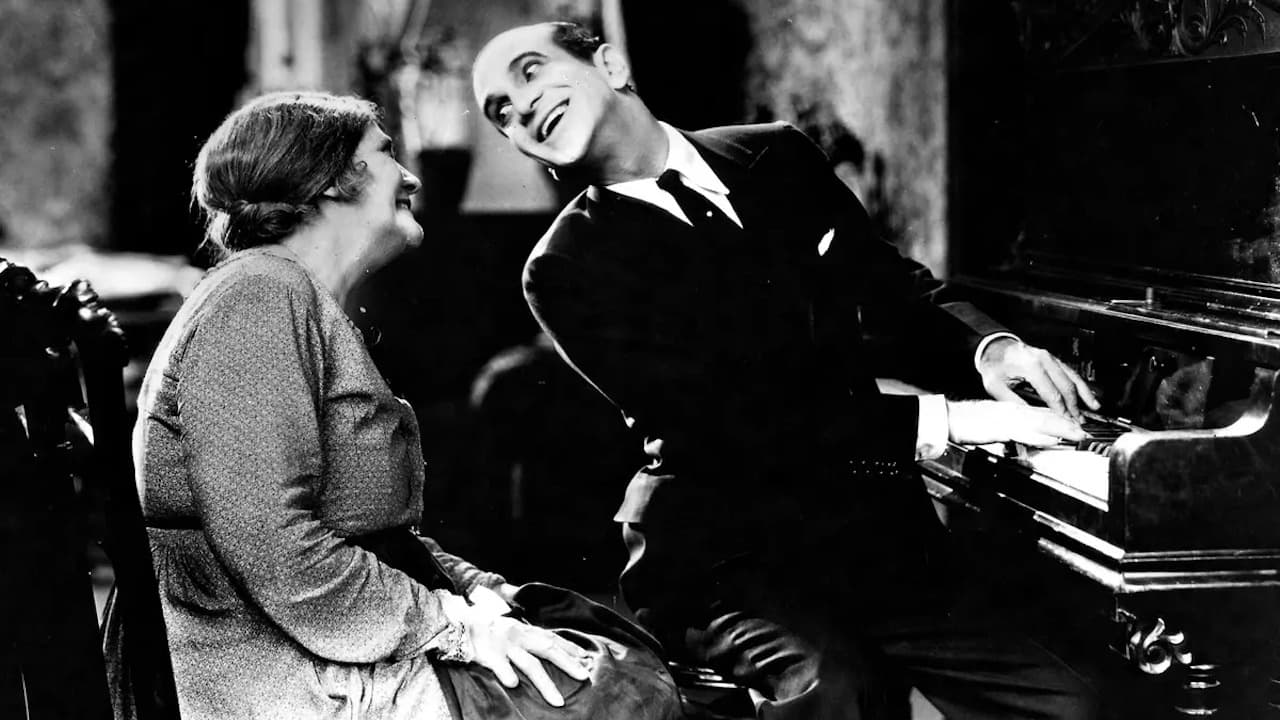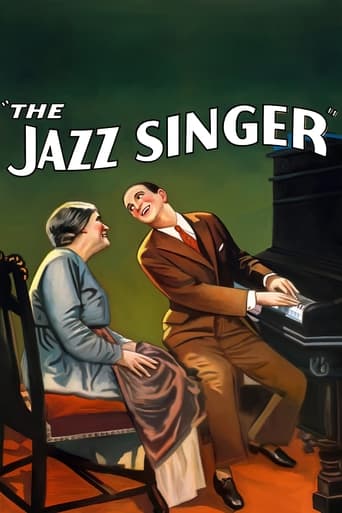ironhorse_iv
Wait a minute, wait a minute, you ain't heard nothing' yet! Adapted for the screen by screenwriter Alfred A. Cohn, and based on Samson Raphaelson's 1921 short story "The Day of Atonement" which also popular the 1926 Broadway play of the same name. The film tells the fictional story of a young Jewish man, Jakie Rabinowitz (Al Jolson), who defies the traditions of his devout family, in order to become a famous jazz singer, under the name, Jackie Robin. Without spoiling the movie, too much, Warner Bros.' and director Alan Crosland's 1927's 'The Jazz Singer' was a mixed bag for me. While, I do champion it, for being one of the pioneers of motion pictures with synchronized sound & dialogue, it's still far from being the great use of it. What confuses me about this film, is odd use of dialogue title cards. I don't get, why they kept most of the dialogue silent, if they did had the ability to put sound effects, music, and singing. It made the film, a little bit jarring. I know, the Vitaphone sound-on-disc system might have been expensive to use, but I felt the film should had either, go all the way, with the sound or none at all. Seeing the film, go halfway, felt a bit lazy. In total, the movie contains barely two minutes, worth of synchronized talking, much or all of it improvised. It's not a 'talkie', as much as film historian, think it is. Another complain, I have against this film is the idea that this, was the first 'talkie'. In truth, the development of commercial sound cinema have start, way before 'The Jazz Singer', became an idea for a film. The first synchronized sound probably started with a film made by William K.L. Dickson at the Thomas A. Edison laboratory in West Orange, New Jersey in the fall of 1894, however the phonograph cylinder have long been badly damaged that's it's nearly unplayable to modern viewers to prove the claim. Nevertheless, later films like 1905's Phonoscène short film about vaudeville artist, Polin by female pioneer Alice Guy-Blaché proves that synchronized singing has been, done, way before, this film, came out. So, why is this movie considered as the first talkie then? It's actually quite simple, Warner Bros was the first studio that took the talking movie seriously and also managed to commercialize it with great success. However, the film's success did not change things overnight; it took a few more years, until Hollywood was fully onboard with film with sound. Anyways, there is other things to praise about this film. It's one of the first movies to feature, a Jewish character outside of biblical films. It's very rare to see, a movie focus so much on the conflict of doing cultural assimilation versus keeping cultural diversity. The typical story of a man seeking his place, attempting to find his voice in the world and the struggles he faced, was pretty smart and compelling to see. No wonder, why the Warner Bros, like it. But the film suffers from the same problem that many films from this era, has, with portraying ethic characters in the modern era. It went a little too racism. The older Jews looks a little too straight out of 'Merchant of Venice' central casting for my taste. However, the most offensive thing in the film, is seeing Jackie Robin portraying in blackface on the Broadway stage. That's a little hard to watch for the modern viewer. Yes, I know, it was a common practice at the time, and help single-handedly introduce African-American culture to white audiences. Nevertheless, it's still troublesome, as most of the practice does portray black people as buffoons. Regardless, I tend to be more forgiving in this film's version of blackface, because it does seem like Al Jolson and his character had good reasons to donning the paint. I believe, the film was trying to portray the troubles, most African-Americans and Jewish people were going through, in America through a metaphor of mutual suffering. After all, some of the songs that Al sing, during the film was about life in the poverty line and helping break down racial attitudes. If anything, the performance in blackface feels more like satire, mockery of white society portrayal of Negro culture than on African American, themselves. Pretty much, like the way, people portray author Harriet Beecher Stowe's 'Uncle Tom's Cabin'. It raise eyebrows. Regardless, it's still uncomfortable to watch, even if Al Jolson in real-life, was known for fighting against discrimination. With that say, I would rather have a black Jewish actor portray Jack, than Al Jolson. I really don't think Jolson is a great actor or singer. He comes across, very corny and amateurism. The music that comes with 'the Jazz Singer', also fall to impress me. It doesn't even sound like Jazz. Where was all the scat singing!? I was really hoping for something, more entertaining, like a tune from Duke Ellington, Louie Armstrong, or Adelaide Hall. None of the songs were really that memorable. Some of the music, they chose, doesn't even fit the tone of the film like composer, Pyotr Ilyich Tchaikovsky's orchestic work 'Romeo and Juliet'. That was just odd! Overall: I can't say, this movie was the most entertaining film about achieving a singing career. But, at least, I can say, it's better than the 1952, 1959 & 1980's remakes of the same name. In the end, it does deserve to be preservation in the National Film Registry of "culturally, historically or aesthetically significant" motion pictures. However, it shouldn't be, nowhere near the top of IMDb 250 films of all-time.
Angus T. Cat
In a review here on IMDb of Jerry Lewis' 1959 TV version of the Jazz Singer a reviewer stated that the Jazz Singer is a film very much of its time. I've now seen four versions: Lewis' TV adaption, the original with Al Jolson, the 1952 Danny Thomas version, the Neil Diamond 1980s version, and Jerry Lewis' TV adaption. I now understand why the Jazz Singer belongs to its original time period. It's not a story about a jazz singer - though all the versions over the years have kept the title. At first I thought it was Jolson's personality and performance that made the story legendary. Certainly the power of hearing Jolson sing was instrumental in making the original movie a sensation.The story is about the old clashing with the new: it's apt that it was chosen for Jolson's vehicle, part silent mixed with the scenes of Jolson singing (as I remember it, none of the scenes with sound were all dialogue: all featured singing, and two of the singing voices weren't Jolson's).It's also about the old generation clashing with the new generation: the father's old world cantor struggling with the son's new world show business song and dance man.The story doesn't really work in the later versions. Jerry Lewis was a good singer and he's fantastic in the opening sequence. But his version is really more about him as a comic. The Thomas version is bland and pedestrian. The Neil Diamond version is cheesy and unconvincing: for one thing, he's not a jazz singer, he's a pop singer. The later movies are dominated by the echoes of the elements of the Jolson movie, already clichés by the end of the 1920s: the big show, the big chance, the call to his father's deathbed, and the last scene with the son honoring the father.The original is charged by its reflections of Jewish culture: the big chance comes on the evening of Yom Kippur, and the son's reconciliation comes through performing his father's role of singing Kol Nidre and leading the evening services. For me one of the most powerful sequences of the movie doesn't feature Jolson singing: it's the scene in which his character hears Yossele Rosenblatt singing- in a theater, note, not in a synagogue. I realized that the Jazz Singer also echoes the anxieties of the first European born generation regarding the American born second generation: will they keep the traditions, or reject everything, including morality and religious belief. The 1950s versions- both the Thomas movie and Lewis' TV play- have a father who is evidently American as well. Hence the story doesn't have the resonance of the fears of adjusting to a new country and the freedom it brings. (Diamond's version features a father who is a Holocaust survivor, but as I remember it the movie doesn't greatly explore the father's ambivalence towards the openness of American society.)The later movies are also dominated by the echoes of Jolson's performance, not just his singing, but also in the scenes in which he pays tribute to his father and his heritage by leading the Kol Nidre service. It's both interesting and bizarre that in the closing of the Lewis version, Jerry Lewis is wearing cantor's robes and his clown makeup in the synagogue before the congregation- a reference to Jolson as a show business legend and to Jolson's performance as Jack Robin, the son conquering the new world with its modern new media, and at the same time continuing the culture of his heritage. The movie still has much to say to modern audiences. And despite the limitations of the early sound technology the outdated conventions of silent film acting and storytelling, and the numbers in blackface which are now seen as offensive, Jolson shines in the performance of his life.

